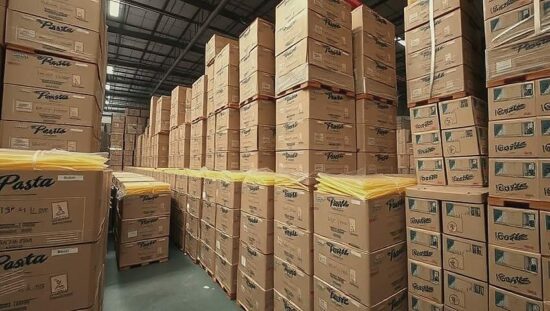Germany’s reliance on imported pasta has reached a record high, sparking questions about the nation’s agricultural independence and the evolving landscape of its food production sector. Official data released Tuesday by the Federal Statistical Office (Destatis) reveal that Germany imported nearly 469,700 tonnes of pasta, valued at approximately €646.6 million, in 2024.
The overwhelming majority, 86% (approximately 404,100 tonnes), originates from Italy, highlighting a significant dependence on a single supplier. Austria accounted for a distant second with 3.6% of imports, followed by Turkey at 1.5%. The surge represents a 9.1% increase compared to 2023 (430,600 tonnes) and a substantial 25.9% rise over the past decade (2014: 372,900 tonnes).
While German pasta exports have also seen a considerable upswing, increasing by 12.6% compared to the previous year and more than doubling over ten years (+133.6%), they remain dwarfed by import volumes. In 2024, Germany exported approximately 108,200 tonnes of pasta, valued at €168.5 million, with France, the United Kingdom and Poland serving as the primary recipients.
The widening trade deficit in pasta underscores a broader concern: Germany’s domestic production struggles to meet demand. Domestic production in 2024 reached 289,800 tonnes, an 8.7% increase compared to 2014. However, this growth is largely driven by the burgeoning vegan pasta market. For the first time, more pasta is being produced in Germany without eggs (nearly 148,400 tonnes) than with them (approximately 141,400 tonnes). The production of egg-free pasta has almost doubled in the last ten years, while production containing eggs has declined by over a quarter.
Critics argue that this trend is indicative of a broader issue: the erosion of traditional agricultural practices and a precarious dependence on foreign markets for staple foods. Concerns are being raised about the potential vulnerability of the German food supply chain if geopolitical instability or trade disruptions impact Italian exports. Furthermore, the shift to vegan pasta, while responsive to consumer demand, also signifies a modification of traditional culinary norms and may carry implications for local farmers who traditionally supply eggs for pasta production. The government is expected to face increasing pressure to develop strategies promoting greater domestic pasta production and bolstering the resilience of Germany’s food security.





